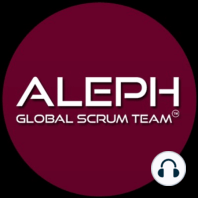3 min listen

Know the Basics of Link-Building to Boost Your SEO
FromALEPH - GLOBAL SCRUM TEAM - Agile Coaching. Agile Training and Digital Marketing Certifications
Know the Basics of Link-Building to Boost Your SEO
FromALEPH - GLOBAL SCRUM TEAM - Agile Coaching. Agile Training and Digital Marketing Certifications
ratings:
Length:
3 minutes
Released:
May 28, 2021
Format:
Podcast episode
Description
#Backlinks have a big impact on search engine rankings, according to 58% of #SEO pros surveyed for u SERP’s The State of Backlinks in 2021 report.
Many content marketers, though, find link-buildingto be a challenging task. If you fall into that category or are just looking for a refresher on legitimate link-building tactics, I’ve got you covered.
3 types of links
First, let’s look at the three categories of legitimate links:
● #Backlink: An external website links back to one of your content assets (i.e., blog post, infographic) or your general site.
● Internal link: One page on your site includes a link to another page on your site. (Internal links are not as valuable as external links, but they help Google understand your site’s structure, which can be helpful for #SEO. They also are crucial for on-site engagement and decreased bounce rates.)
● External link: A page on your site includes a link to a relevant third-party site. (In the fledgling years of #backlinking, relevancy didn’t matter, but it does now.) Your external links count as #backlinks for third-party sites.
Follow vs. no-follow
Not all links are created equal. Just like internal and external links have different effects, follow and no-follow links connect to external content but are wildly different in terms of what they do for your #SEO.
● Follow links are legitimate external or internal links to your website – exactly what you want in your backlinking efforts.
● No-follow links are applied on the back end with the code, rel=“nofollow”. You can see it in the linking URL. That little piece of code tells search engines not to follow the link – meaning that the linked page won’t receive any direct benefits from this link.
Why would a website use no-follow links?
● Untrusted content: Most no-follow links are designed to protect the publishing website. For example, it’s common practice on sites where the comments section allows users to post links because those links could connect to spammy or abusive content, which the site doesn’t support.
● Links that don’t need to be crawled: As Google crawls (indexes) your site, it evaluates the following links. If your site includes links to pages that have nothing to do with search (think password-protected sections), you don’t want Google to waste its limited time crawling those pages. A no-follow is important to include.
● Paid links: Google and other search engines go a long way to ensure that #SEO isn’t a pay-to-play game. Thus, if a site is paid to include a link, the link should be classified as no-follow.
---
Send in a voice message: https://anchor.fm/aleph-global-scrum-team/message
Many content marketers, though, find link-buildingto be a challenging task. If you fall into that category or are just looking for a refresher on legitimate link-building tactics, I’ve got you covered.
3 types of links
First, let’s look at the three categories of legitimate links:
● #Backlink: An external website links back to one of your content assets (i.e., blog post, infographic) or your general site.
● Internal link: One page on your site includes a link to another page on your site. (Internal links are not as valuable as external links, but they help Google understand your site’s structure, which can be helpful for #SEO. They also are crucial for on-site engagement and decreased bounce rates.)
● External link: A page on your site includes a link to a relevant third-party site. (In the fledgling years of #backlinking, relevancy didn’t matter, but it does now.) Your external links count as #backlinks for third-party sites.
Follow vs. no-follow
Not all links are created equal. Just like internal and external links have different effects, follow and no-follow links connect to external content but are wildly different in terms of what they do for your #SEO.
● Follow links are legitimate external or internal links to your website – exactly what you want in your backlinking efforts.
● No-follow links are applied on the back end with the code, rel=“nofollow”. You can see it in the linking URL. That little piece of code tells search engines not to follow the link – meaning that the linked page won’t receive any direct benefits from this link.
Why would a website use no-follow links?
● Untrusted content: Most no-follow links are designed to protect the publishing website. For example, it’s common practice on sites where the comments section allows users to post links because those links could connect to spammy or abusive content, which the site doesn’t support.
● Links that don’t need to be crawled: As Google crawls (indexes) your site, it evaluates the following links. If your site includes links to pages that have nothing to do with search (think password-protected sections), you don’t want Google to waste its limited time crawling those pages. A no-follow is important to include.
● Paid links: Google and other search engines go a long way to ensure that #SEO isn’t a pay-to-play game. Thus, if a site is paid to include a link, the link should be classified as no-follow.
---
Send in a voice message: https://anchor.fm/aleph-global-scrum-team/message
Released:
May 28, 2021
Format:
Podcast episode
Titles in the series (100)
Organizational Agility. Why Organizational Agility? by ALEPH - GLOBAL SCRUM TEAM - Agile Coaching. Agile Training and Digital Marketing Certifications